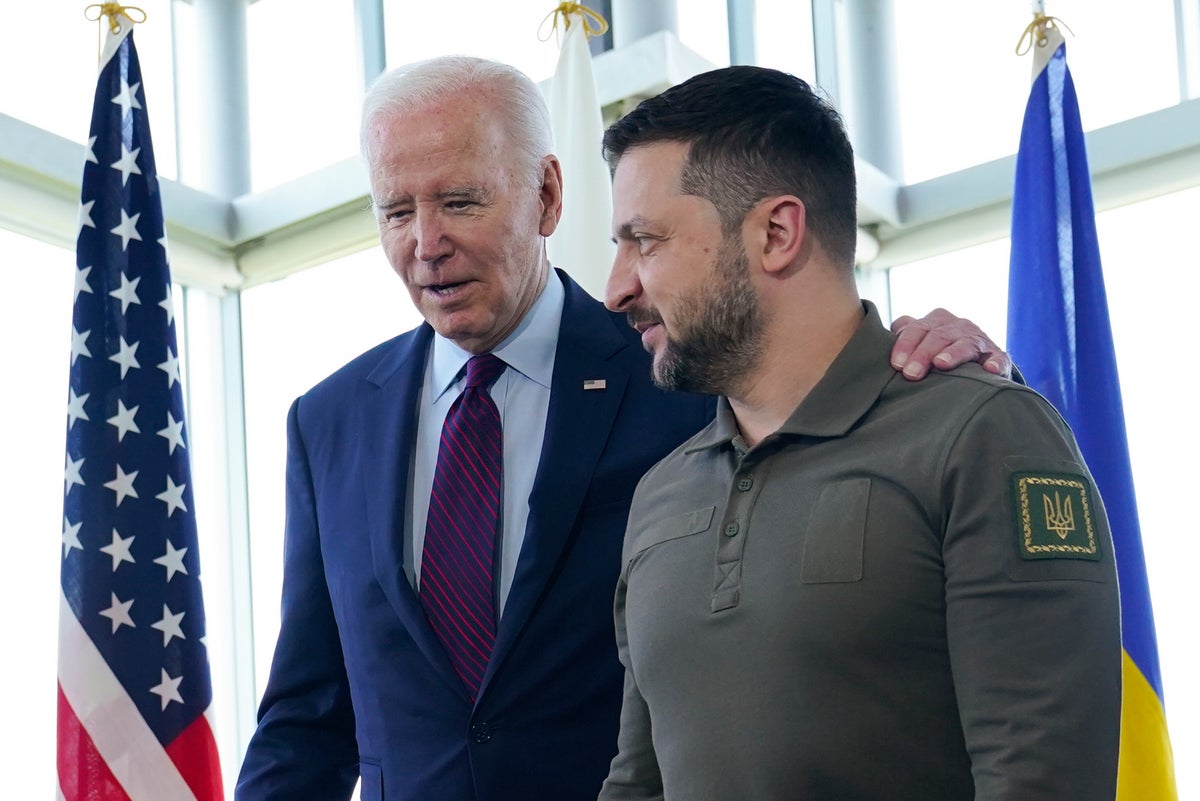
Joe Biden will meet with Ukrainian president Volodymyr Zelensky at the Nato summit in Lithuania on Wednesday, US officials confirmed to The Independent.
The meeting comes as Biden has expressed doubts in recent days about Ukraine’s long-sought goal of joining the trans-Atlantic alliance.
“I don’t think there is unanimity in Nato about whether or not to bring Ukraine into the Nato family now, at this moment, in the middle of a war,” he told CNN last week.
“If the war is going on, then we’re all in war,” he added. “We’re at war with Russia, if that were the case.”
The president also said that Ukraine would need to make reforms in terms of “democratization” before joining the alliance.
Nato chief Jens Stoltenberg said in a press conference from Vilnius on Monday he is “absolutely certain” Nato members will offer “unity and a strong message” about Ukraine’s potential membership in the alliance.
Earlier that day, Kremlin spokesperson Dmitry Peskov reiterated Russia’s long-running warnings against Ukraine joining Nato.
“You know the absolutely clear and consistent position of the Russian Federation that Ukraine’s membership in Nato will have very, very negative consequences for the security architecture, the already half-destroyed security architecture in Europe,” he said, according to The Guardian. “And it will be an absolute danger, a threat to our country, which will require from us a sufficiently clear and firm reaction.”
President Joe Biden walks with Ukrainian President Volodymyr Zelenskyy ahead of a working session on Ukraine during the G7 Summit in Hiroshima, Japan, in May— (Copyright 2023 The Associated Press. All rights reserved.)
Presidents Biden and Zelensky last met in May at a G7 summit in Japan.
Their discussions will likely centre on US aid to Ukraine, as well as bigger-picture security guarantees.
So far, the US has sent more than $76bn in aid to the Eastern European nation, according to the Council on Foreign Relations, more than $46bn of which has been military-related.
Most controversially, the US anounced earlier this month it would begin sending cluster munitions to the besieged country as part of an $800m aid package.
The weapon type, which opens in the air and releases smaller “bomblets” across a wide area, has been criticised for causing high rates of civilian casualties. Dud bombs can remain unexploded for decades, heavily raising the risk of accidental deaths for non-combatants.
The move to send such weapons has been criticised by US allies.
“Canada is fully compliant with the Convention and we take seriously our obligation under the Convention to encourage its universal adoption,” the Canadian government said in a statement last week.
UK prime minister Rishi Sunak has also highlighted his country’s refusal to use cluster bombs, though he acknowledged the US had to make its own “difficult decision” about what aid to send to Ukraine.
“Well, the UK is signatory to a convention which prohibits the production or use of cluster munitions and discourages their use,” he told broadcasters last week.
“We will continue to do our part to support Ukraine against Russia’s illegal and unprovoked invasion, but we’ve done that by providing heavy battle tanks and most recently long-range weapons, and hopefully all countries can continue to support Ukraine.”
The US hasn’t used cluster munitions since the Iraq war in the early 2000s, and more than 120 countries have joined an international convention banning their use.
Ukrainian officials, however, welcomed the development, including Mykhailo Podolyak, a senior adviser to the Ukrainian president.
“In the great bloody war which has been ongoing for more than 16 months, and which will predetermine the future of the world … the number of weapons matters. So, weapons, more weapons, and more weapons, including cluster munitions,” he said last week.
The White House has argued it has received “written assurances” Ukraine will use the rounds “in a very careful way that is aimed at minimising any risk to civilians,” according to US national security adviser Jake Sullivan.
Ukrainian defence minister Oleksii Reznikov said in a statement last week the country would comply with human rights law, and pointed out how Russia is already using cluster munitions against Ukrainian civilians.
“I would like to stress that in exercising our inalienable right to self-defence we will continue to strictly comply with all the international humanitarian conventions signed and ratified by Ukraine,” he wrote.
The question of ammunition has been a central one in the Ukraine war.
Ammunition supplies are low both within the country, and within the countries supplying firepower to hold off the Russians, according to the White House.
“The Ukrainians are running out of ammunition,” Mr. Biden told CNN. “This is a war relating to munitions. And they’re running out of that ammunition, and we’re low on it.”
Such considerations will be key as Ukraine continues a counterattack that began last month, which Zelensky has admitted is going “slower than desired.”
The Ukraine war isn’t the only major topic that will be considered at the summit.
Turkey announced on Monday it will support Sweden’s bid to join Nato, after previously blocking it.
If Sweden successfully joins the alliance, it will complete the expansion of Nato launched in response to Russia’s invasion of Ukraine, and allow the alliance to grow by thousands of miles along the Baltic Sea.
Andrew Feinberg contributed reporting to this story.







